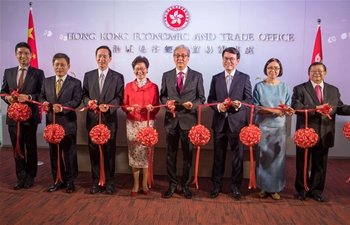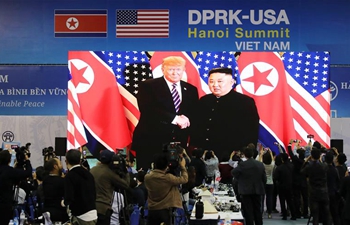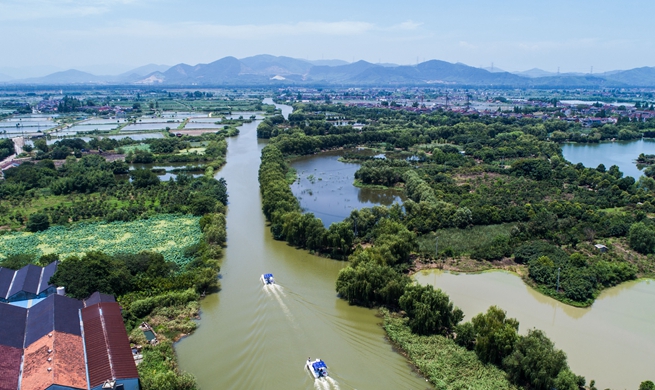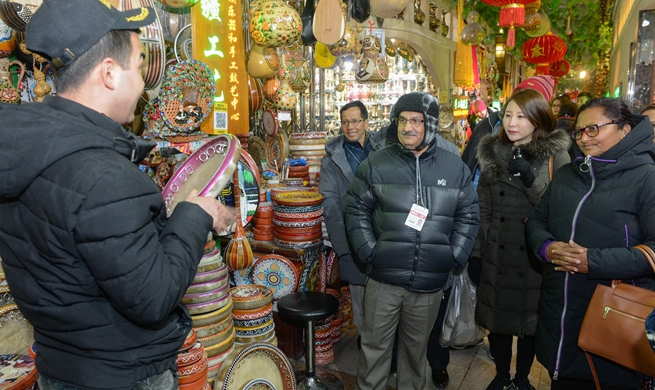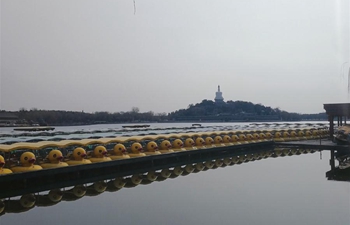by Murad Abdo
ADEN, Yemen, Feb. 28 (Xinhua) -- The UN special envoy to Yemen Martin Griffiths concluded on Thursday his two-day talks with senior leaders of the Houthi rebel group.
However, he did not achieve concrete results to break a deadlock over the withdrawal of troops from the strategic Red Sea port city of Hodeidah.
A local Yemeni official based in the Houthi-controlled capital of Sanaa said the conversations with the UN envoy were "not productive," as senior Houthi leaders laid down new conditions for withdrawing their fighters from Hodeidah.
"The UN envoy exerted hard efforts and conducted talks with a number of key Houthi leaders, but did not succeed in convincing them to withdraw from Hodeidah," the source said on condition of anonymity.
"The Houthi leaders laid down some conditions that must be met before the withdrawal of their forces from Hodeidah," he added.
One of the conditions included appointing forces linked to the Houthi group to be in charge of managing government institutions and Hodeidah's seaport following the fighters withdrawal, according to the source.
On Wednesday, Yemen's Houthi rebels said they were ready to withdraw unilaterally from the ports of Hodeidah if requested by the UN, according to a statement released by Houthi-controlled Saba news agency.
"We are ready to continue to implement the agreement unilaterally if the UN requested that," Saba quoted Mahdi al-Mashat, president of the Houthi-run Supreme Political Council, as saying.
On the same day, Yemen's Foreign Ministry said in a statement that the Houthi rebel group violated the agreed plan and refused to withdraw its fighters from Hodeidah.
"The international community should realize that the Houthis are following a systematic policy to disrupt peace efforts through placing impossible conditions before attending talks or signing any agreements," the ministry's statement said.
Griffiths left Sanaa following his meetings with Houthi authorities and headed to Saudi Arabia's capital of Riyadh to meet with exiled Yemeni President Abdu-Rabbu Mansour Hadi.
Just hours following his departure, fighters of the Iranian-backed Houthi group launched an attack with mortar shells against a residential neighborhood in Tuhyata district of Hodeidah, killing five children, according to a government statement.
Scores of people died as a result of sporadic attacks and shelling launched by the two warring rivals in Hodeidah despite the UN-backed cease-fire declared during Sweden's peace talks last December.
A government official told Xinhua that new difficulties arose during the talks of the UN envoy with the Houthis and further complicated the situation in Hodeidah.
"The Houthis want to deceive the UN by withdrawing only a specific number of fighters and bringing new batches of their fighters wearing military uniforms to manage the government institutions in Hodeidah," the official said anonymously.
He said the government strongly refused to accept handing over the management of Hodeidah's facilities to "security units trained and equipped by the Iranian-backed Houthis."
Other Yemeni government officials expressed their displeasure at the obstacles posed by the Houthi rebels who refused to implement the first phase of the redeployment plan according to the previous agreements.
The officials demanded Michael Lollesgaard, UN chief observer in Hodeidah, clarify the causes that delayed the pullout of Houthi rebels from Hodeidah.
Mohammed al-Ahmadi, a politician and writer, said the Iranian-backed Houthis are deliberately attempting to waste time by delaying the withdrawal of their militias from Hodeidah for the purpose of re-arranging their military positions.
"The Houthis are building their military capabilities by establishing more factories to produce landmines inside Hodeidah and don't have real interest in withdrawing from the city at this time," he said.
"There must be an immediate intervention of powerful countries because pressure on Houthis will help push the peace efforts into success," he added.
A deal reached in Stockholm in December 2018 said the Yemeni government and Houthi rebels should withdraw troops from Hodeidah city and the ports of Hodeidah, Salif and Ras Issa.
Hodeidah is the major Red Sea port in Yemen, which handles some 70 percent of the food and fuel imports into Yemen.
The Red Sea Mills based in Hodeidah currently, which store enough grains to feed 3.7 million people for a month, is at risk of rotting, the UN's World Food Program has said.
On Wednesday, efforts exerted by the UN succeeded in convincing Houthis to open blocked roads and finally managed to reach the warehouses of the mills.
Demilitarizing of the region is aimed at allowing humanitarian aid to reach Yemenis under the threat of famine because of the civil war in its fourth year.




